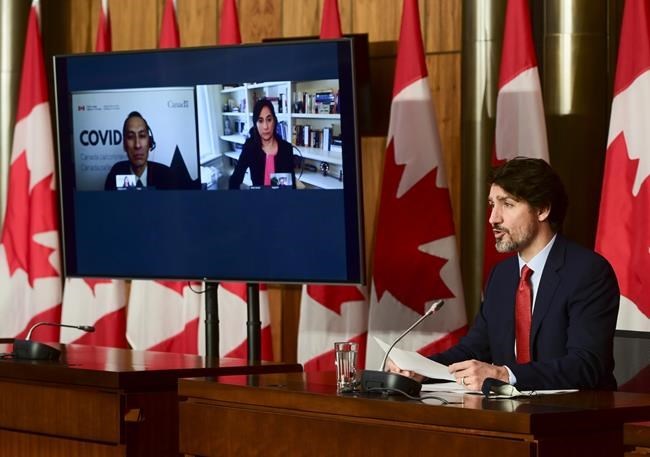
Prime Minister Justin Trudeau holds a press conference during the COVID-19 pandemic in Ottawa on Tuesday, March 30, 2021. He is joined virtually by Dr. Howard Njoo, Deputy Chief Public Health Officer, and Minister of Public Services and Procurement Anita Anand. THE CANADIAN PRESS/Sean Kilpatrick
Republished May 27, 2021 - 3:50 PM
Original Publication Date May 27, 2021 - 8:31 AM
Members of the military are being deployed to Manitoba where surging COVID-19 cases have overwhelmed hospitals, while the prime minister has put his support behind international efforts to understand how the global pandemic began.
"I know there are a lot of theories out there, but we need to make sure we are getting to a full and complete airing of the facts to actually understand what happened," Justin Trudeau said Thursday.
United States President Joe Biden ordered intelligence officials there Wednesday to redouble efforts to investigate the origins of the COVID-19 virus, including any possibility the trail might lead to a Chinese laboratory.
Trudeau said such efforts will not only ensure accountability, but could also provide insight into how to protect the world from future pandemics.
Meanwhile, a four-week military mission was to start Friday in Manitoba, where strict public health orders have been extended to try to tackle COVID-19's stubborn grip on the province.
The province's intensive-care units are so full that 26 critical patients have been transferred to Ontario for treatment in the last 10 days.Saskatchewan is expected to start taking some patients, too.
"We are not in a position to reopen," said Premier Brian Pallister.
The military help was requested last week as the province posted the highest daily case numbers, per capita, in the country.
There were 295 more cases and eight additional deaths reported in Manitoba.
While infections remain high in that province, the number of active cases nationally is half what it was at the peak of the third wave in mid-April.
Dr. Howard Njoo, Canada’s deputy chief public health officer, said 22 million vaccines have been administered. As of last weekend, more than 57 per cent of those 12 and older had received at least one dose, he said.
Brig.-Gen. Krista Brodie, who is in charge of federal vaccine distribution, said shipments are ramping up with 2.4 million Pfizer-BioNTech doses expected in June and nearly 2.3 million in July. Another 500,000 doses of the Moderna vaccine are expected next week.
Some provinces are dealing with thousands of doses of Oxford-AstraZeneca vaccine that are due to expire in a few days.
Federal Health Minister Patty Hajdu has written to provincial and territorial leaders encouraging them not to waste any and to share with each other when they can.
It's not clear how many doses are at risk of being wasted, but Ontario is scrambling to use some 45,000 shots by the end of May. Another 10,000 are set to expire in June.
Newfoundland and Labrador officials said they have returned about 1,400 AstraZeneca doses about to expire to the federal distribution team.
Brodie said work is being done to ensure all are used.
"There's still time before those first doses expire," Brodie said.
Quebec officials announced that province will shorten the delay between first and second AstraZeneca shots to eight weeks from 16 weeks.
Hospitalizations in Quebec are at their lowest level in more than six months and the province has begun to slowly relax restrictions. The 8 p.m. curfew — in place since Jan. 9 — was lifted Thursday evening and restaurant patios in some areas have reopened.
Health officials in British Columbia announced that province will also be decreasing the interval between the first and second dose from 16 weeks to eight weeks because of a stable supply of the Moderna and Pfizer vaccines. In Ontario, Premier Doug Ford mulled whether to reopen schools as health officials announced 1,135 new cases and 19 more deaths.
Ford said he has asked experts and education leaders for input on whether it's safe to have children back in classrooms.
Schools have been closed in Ontario since April. But infections have been steadily declining in recent weeksas more people get vaccinated.
Ontario is also considering shortening the interval between doses of vaccines.
A new report from Statistics Canada found that more people are getting on board to be vaccinated.
Data indicates that in January and February, 82 per centof those surveyed said they were somewhat or very likely to get the vaccine. That was slightly up from 80 per cent at the end of last year.
In Alberta, Premier Jason Kenney said that getting a dose "is a free choice" the day after releasing a reopening plan tied to vaccination rates going up.
"Getting the vaccine is a voluntary decision that individuals must make," Kenney said during a news briefing with the chief medical officer of health.
Kenney said his United Conservative Party government would be changing legislation to make sure mandatory vaccination doesn't happen and it would not consider any type of vaccine passport.
Kenney, however, said getting vaccinated was the best way to keep people safe and ensure restrictions were lifted.
"Vaccines are our ticket to getting past the pandemic and getting our lives back."
Officials said 59.9 per cent of Albertans aged 12 and up have had their first dose of a vaccine.
There were 513 new cases of COVID-19 in Alberta Thursday and one more death.
This report by The Canadian Press was first published May 27, 2021.
News from © The Canadian Press, 2021